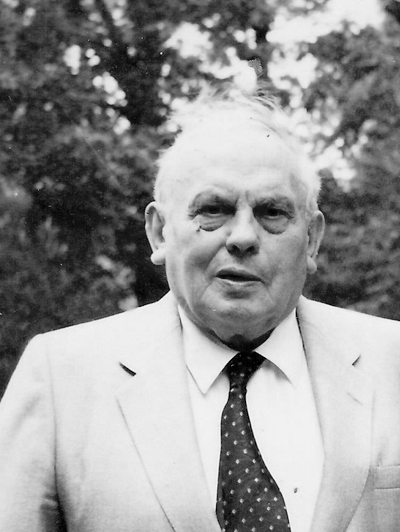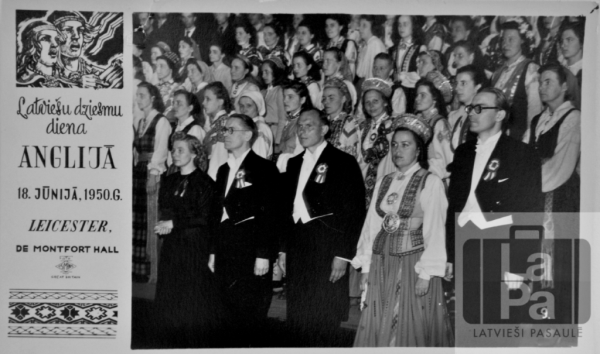Viktors Baštiks
1912-2001
Composer, conductor
Viktors Bastiks was born on 3 February 1912 in the village of Skatre, Pērkone parish, about 15 km south of Liepaja. He was the third and youngest son in the family, after his brothers Eduards and Voldemars (Voldemārs). Both parents were farmers and active members of the local Baptist congregation, where Father Janis (Jānis) was the leader of the church choir and mother Otilija (Otīlija) – a singer in this choir, sometimes also a soloist. In later years of her life, Otilija became known as a poet and translator of spiritual songs under the pseudonym Liesma. When Viktors was two years old, the family moved to Liepaja where his father opened a small goods shop. Soon, complications arose in the family life and his parents' marriage ended in divorce. All three sons remained under the care of their mother.
Bastiks graduated from Liepaja Augusts Saulietis Primary School, then Liepaja State Secondary School. His first steps in music are related to Liepaja. Due to family circumstances, the opportunity to study music professionally came later than for other musicians. For a long time as a young man, he was only involved in music on his own accord, so his education was limited and superficial – for a few years he studied cello with Bierants Kunkis (Bierants Ķuņķis), organ with Janis Turss (Jānis Turss), and a bit of theory at the Liepaja People's Conservatoire. At the age of 16 he took on the role of organist at Grobins Baptist Church. After graduating from high school, his main job was as a clerk in the Land Registry Department, and later, after completing a special course, he got a job with the Danish Telegraph Company as a telegraphist.
Since his childhood, Bastiks was particularly interested in the field of composition, so he did everything he could to get into the conservatoire. In 1939 he was admitted to the composition theory class of the Latvian State Conservatoire under Professor Jazeps Vitols (Jāzeps Vītols) where he studied for five years, working daily at the telegraph and directing the Jelgava Baptist Church Choir (1940–1941) and the Baptist Seminary Church Choir (1941–1944). He was also one of the three chief conductors at the Baptist Song Day in Riga. In 1944, during the last semester of his studies, Bastiks was conscripted into the army.
During the war, Bastiks was injured in his hand, and a splinter was left in his left wrist for life. After captivity in Putlos and Zedelgem in Germany he took up the role of choir director in the Ingolstadt refugee camp (1946) and participated in the Latvian Song Festival in Esslingen with it and was one of the organisers and conductors of the Latvian Baptist Five Days of Spiritual Song. In 1947, he went to England with the men's choir founded by Roberts Zuika in Dundaga, which had already resumed its activities in Hagenava camp and continued performing in Putlos and Lübeck, and whose leadership had to be temporarily taken over by Bastiks. The period spent in England was particularly productive for conductor Bastiks. In England, Bastiks' outstanding men’s choral songs “Velu laiva” (Boat of Spirits, with a text from “Daugava” by Rainis) and “Ka sniegi” (As snow, with a text by J. Jaunsudrabins (J. Jaunsudrabiņš)) were written. He was a member of the organising committee and chief conductor of the 1st English Latvian Song Days in 1949 and the 2nd English Latvian Song Days in 1950 in Leicester.
In 1950, after handing over the leadership of the choir to Zuiks, Bastiks led the English Corby Choral Society for two years and in 1952 left for the USA by ship, settling in Philadelphia where he lived and worked for the rest of his life. His brother Eduards Bastiks (Eduards Baštiks) had already founded the American Latvian Baptist Choir Association with the main aim of organising spiritual song days. Viktors became the main promoter of this idea. He was one of the conductors of 40 Baptist church song days, and from 1970 to 1986 he was the head of the American Latvian Baptist Choir Association. He directed the Philadelphia Latvian Baptist Church choir for 36 years.
Bastiks considered the main goal of his life to be composing spiritual songs and publishing collections of songs. He arranged several books of sacred hymns and wrote 386 compositions, including 30 cantatas. In secular music: three cantatas, three choral song cycles, 40 choral songs, 24 settings of folk songs for choirs, 18 solo songs, and 34 instrumental works.
A particularly great, symbolically satisfying event in his life was to stand on Latvian soil again 48 years after leaving his homeland and to conduct his own songs at the Latvian Baptist Song Festival in Talsi on 18 July 1992 at the age of 80. He said: ‘We welcome the day we have thought about so desperately in foreign lands, the day of Latvian freedom! We bow our heads in deep gratitude to our Heavenly Father and lift our hearts in song!’ Bastiks has shown by his deeds that he served God and loved his homeland for all his lifetime. Bastiks’ works have been performed several times at Latvian song festivals in the USA. He has received the Honorary Award of the PBLA Culture Foundation and the Krisjanis Barons Prize in 1989. In 1991 he became a foreign member of the Latvian Composers' Union.
His life in this world came to an end on 31 October 2001 in Philadelphia, USA.
Information sources
Baštiks, Viktors (1912–2001). (b.g.). https://www.musicabaltica.com/lv/komponisti-un-autori/bastiks-viktors/
Purvs, Arvīds. (1992, 1. janvāris). Viktors Baštiks latvju mūzikas ceļos. Latvju Mūzika, 21, 2269.–2286. Latvju Mūzika, Nr.21 (01.01.1992) (periodika.lv)





